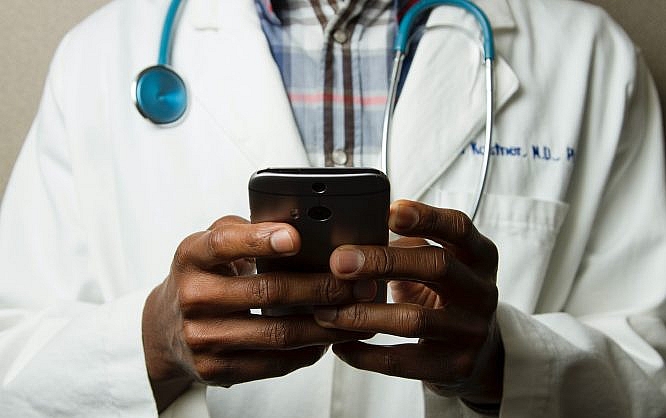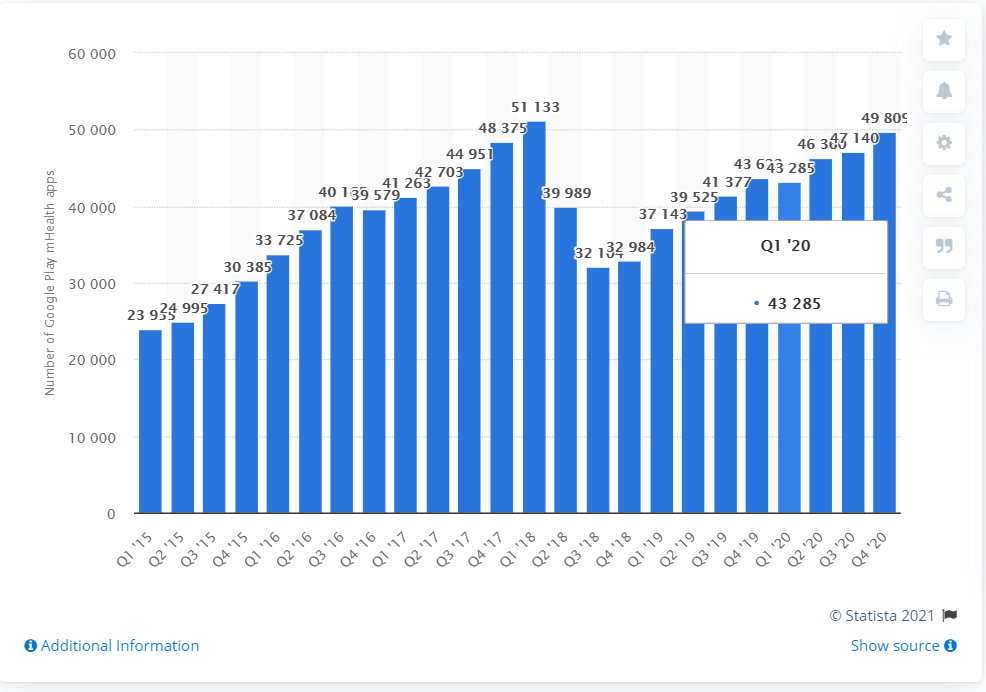Healthcare Mobile Apps: Its Importance During COVID-19

Healthcare Apps: The current generation is a victim of the pandemic, as well as infodemic. You know well which pandemic am I referring to- Covid 19. But, are you wondering what is this “infodemic”? It is nothing but the widespread information as well as misinformation associated with novel coronavirus circulated on the news, print, and social media.
Well, a year ago when the lockdown was announced for the first time, I am pretty sure, you wouldn’t have thought it would run so long. While everyone hoped for a normal life, the second wave stepped in. However, with the modified version of CoronaVirus, we too have modified our way of dealing with the pandemic outbreak. Technology has essentially turned out to be a boon.
Mobile Apps and its Applications during the Pandemic
Though misconceptions were spread through different media platforms, mobile applications and social media have turned out to be helpful too. This includes software as well as apps concerned with tracking the spread of COVID-19, provisioning remote healthcare, contact tracing, vaccine management, and much more! And all you need is a smartphone to access it. According to mobile app development companies in the USA, the mobile app industry experienced a boom like never before during the pandemic. It was mainly because of the increased use of mobile phones and mobile apps.
The smartphone leaders, Apple and Google, have their ways of ensuring secure access to the software. Apple checks against malicious software. It allows apps recognized by institutions like the government, healthcare providers in the app store. On the other hand, Google has dedicated a section titled “Coronavirus: Stay informed” in the Play Store. This contains all the certified apps to help you stay prepared along with being informed.
The Rise in Demand for Software and Mobile Applications
Did you know that there are more than 325,000 mobile health apps in the Play Store and App Store?! Yes, you heard that right.
In the crisis of COVID-19, many sectors have been hit drastically. However, the demand for the software, mobile apps, and AI sector has increased significantly. The need to work remotely has created this demand. The restrictions to move out of the house have resulted in people spending time on apps.

Coronavirus has created an urgency in global healthcare. The need is to ensure safety and reduce risks concerned with the disease by creating awareness. Also, provide facilities at the doorstep through mobile apps.
Having the right application can be a tool at the right time. It serves the utilitarian purpose, social needs, as well as entertainment. Similarly, it makes sense to have a mHealth app that caters to various needs such as staying fit, tracking Covid-19 status, knowing safe and unsafe zones, getting telehealth support, getting medicines, and much more.
What are healthcare mobile apps?
While technology has taken prominence in our lives, the healthcare sector has entered this sphere with telemedicine. Mhealth is inclusive of gadgets like smartphones, tablets, wearables, and others. These provide services related to health and wellness. It is handy for the users as they can access it anywhere on the go.
Health apps are useful in diagnosis, treatments, and tracking the health conditions of the patient. The doctors and patients can communicate with each other remotely.
Wellness apps too come under MedTech. Here the app supervises the user’s overall health. It enhances both the physical and mental health of the user.
Importance of mHealth apps:
- A bridge that connects people, healthcare professionals, and health systems
- Online expert advice avoids the need of stepping out in the pandemic
- Home delivery of medicines ensure you never run out of them
- A reliable and personalized source of information
- Patient care at fingertips beyond the boundaries of the clinics
- Monitor patient health constantly and track symptoms
- Get real-time notifications about COVID-19
- Ensure self-care measures to reduce the spread of the virus
- Get statistics on vaccines
Types of Healthcare apps
Let us know the types of healthcare apps. It is widely classified as apps for healthcare providers and users.
MHealth Apps for Healthcare Providers
The apps that are developed for doctors and other healthcare professionals come under this category. Here, the app will have customized features that a clinic needs. Thus, these apps are sophisticated. Some of the purposes are:
- Patient Monitoring- Track patient’s condition and report the progress, storehouse of health records.
- Healthcare reference apps- Latest data on diseases and medicines.
- Professional Networking- A platform to share knowledge and interact within the professionals’ community.
- Doctor’s appointment- Keep a track of your appointments with notifications of checkups and schedules.
- Telehealth apps- Provide online consultations with telemedicine apps, especially during emergencies.
- Vaccine Management- Administer vaccines and notify the patients of their next dose. Monitor the health after the vaccine administration as well.

Mobile Apps for Users
- Reminders- Set reminders for medicines, tests, exercises, etc.
- Educative apps- Information on health conditions.
- Mental Health- Ensure mental health with meditation, stress relief, sleep patterns, etc. Related: Mental Health Apps
- Healthy Lifestyle- Have a healthy life with fitness, weight loss, exercise, etc.
- Nutrition- Get a balanced diet with healthy recipes and clean eating guides.
Pharmaceutical Apps
Healthcare and medicine are complementary to each other. Pharmaceutical companies have entered the digital sphere with medicine sales with the facility of home delivery and online transactions.
Ensure these Key Features in your Health App
Easy signup and logins
Registration as well as the sign-in process must be quick and easy. It should ask for minimal personal details of the mobile app user. Ensure easy logins with the phone number or email ids.
Profile access
The profile of the patient and doctor should have all the necessary details. It should be easily accessible. For the patient, it must include the health records, whereas for doctors it must reflect their expertise. It should provide details such as specialization, experience, contact details, etc.
Searching the physicians
The app must provide filters to the user. It should recommend doctors as per the needs of the patient. It should consider factors such as experience, expertise, reviews, charges, as well as location. It should provide smooth in-app communication.
Appointment
After shortlisting and selecting the doctor, the patient should be able to book appointments. Doctors have to confirm the appointment by confirming or modifying the time. Also, it should provide lab booking.
Reminders
The app should provision to create a plan. Accordingly, it should remind the users about the appointments. Pill administration, and other check-ups.
Remote Consultation
The app should provision in-app consultation through voice or video calls. It is beneficial in case of emergencies. It should provide a facility for prescriptions too. It should have online payment gateways for the same.

Privacy and Security
It should adhere to the legal requirements. Besides, all the personal information of the patient, doctors, and the agency should have privacy. It should eliminate risks of any type.
Easy Dashboard
The dashboard should have a clean layout. It should provide a summary of the overall health status of the user. It should also provide sharing options for the reports.
Integration with wearables
The apps must be able to integrate with the smart bands and other devices. This helps to keep a constant record of the health conditions.
Cloud integration
The integration with the cloud enables data access anywhere, at any point of the time. It should be easily accessible.
Let’s wrap up: Mobile Health Apps and Pandemic

(Number of mHealth apps on Play Store over the years- Source: Statista)
In the era of the pandemic, it's necessary to pay attention to health. Staying fit is the need of the hour. You can read more about the Internet of Behavior for better understanding.
The estimated mHealth global market is said to be 189 USD in 2025! Well, that says it all. The demand for healthcare apps has risen since the pandemic outbreak. We can essentially say that mobile health apps have not only helped in administering care to patients but also in providing the necessary information. Ensure the right use of mHealth apps. Let us stay fit with health apps and join hands in fighting against the virus.
Featured image by National Cancer Institute on Unsplash
